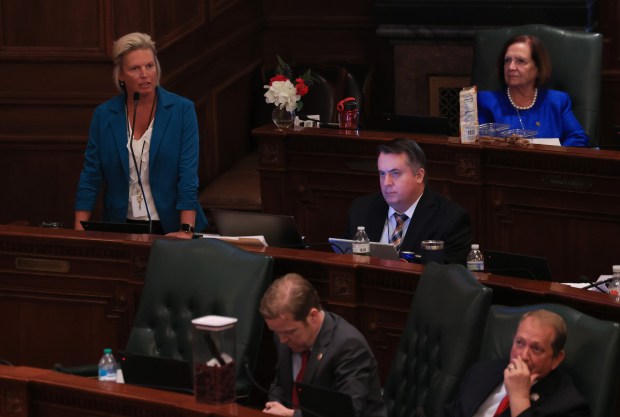A former Chicago college student sentenced to eight years in federal prison for spying on behalf of the Chinese government is part of a prisoner swap with Beijing in the final months of the Biden administration that includes the release of three Americans, the Tribune has learned.
Ji Chaoqun, 33, a onetime student at the Illinois Institute of Technology, was convicted by a jury in Chicago in 2022 of gathering information on scientists and engineers in the U.S. with valuable knowledge about aerospace technology, artificial intelligence and even aircraft carriers.
In sentencing Ji to eight years in prison, U.S. District Judge Ronald Guzman said it was clear that his ultimate goal was to become a “sleeper agent” and infiltrate some of the United States’ most sensitive operations.
Ji had spent about four-and-a-half years in custody by the time he was sentenced and was due to be released and deported back to China in July 2025, records show. As of Wednesday, though, he was no longer in custody according to online records for the U.S. Bureau of Prisons.
A motion filed by the U.S. attorney’s office Wednesday on Ji’s case in Chicago stated he “has been released from U.S. Marshals custody,” but other details as to why remained sealed.
Sources with knowledge of the situation say Ji’s release was part of a diplomatic agreement with Beijing made public Wednesday in which three American citizens imprisoned for years by China have been released and are returning to the United States.
Also released by the U.S. as part of the deal, the sources said, was Ji’s handler, Xu , a senior intelligence officer in China’s main spy agency and the first Chinese spy ever brought to the U.S. to face criminal prosecution.
Xu had been sentenced to 20 years in prison after his conviction in federal court in Cincinnati in November 2021 on charges he stole trade secrets from military contractor GE Aviation. He had not been due for release until 2035, but federal prison records showed he was also no longer in custody as of Wednesday morning.
Meanwhile, the three Americans who were released are Mark Swidan, Kai Li and John Leung, all of whom had been designated by the U.S. government as wrongfully detained by China. Swidan had been facing a death sentence on drug charges while Li and Leung were imprisoned on espionage charges.
“Soon they will return and be reunited with their families for the first time in many years,” the White House said in a statement.
The release comes just two months after China freed David Lin, a Christian pastor from California who had spent nearly 20 years behind bars after being convicted of contract fraud.
U.S.-China relations have been roiled for years over major disagreements between the world’s two largest economies on trade, human rights, the production of fentanyl precursors, security issues that include espionage and hacking, China’s aggressiveness toward Taiwan and its smaller neighbors in the South China Sea, and Beijing’s support for Russia’s military-industrial sector.
The release of Americans deemed wrongfully detained in China has been a top agenda item in each conversation between the U.S. and China, and Wednesday’s development suggests a willingness by Beijing to engage with the outgoing Democratic administration before Republican President-elect Donald Trump’s return to the White House in January.
Trump took significant actions against China on trade and diplomacy during his first term. He has pledged to continue those policies in his second term, leading to unease among many who fear that an all-out trade war will greatly affect the international economy and could spur potential Chinese military action against Taiwan.
Still, the two countries have maintained a dialogue that has included a partial restoration of military-to-military contacts. President Joe Biden and Chinese leader Xi Jinping met this month to discuss potential improvements.
Ji Chaoqun’s case, meanwhile, was profiled in the Tribune in 2019 as a symbol of a growing area of worry for U.S. authorities: a sophisticated and far-flung mission by the Chinese government to have spies and foreign agents steal ideas and technology from firms and defense contractors across the country.
The charges against Ji alleged that he was targeted by agents with China’s Ministry of State Security shortly before coming to Chicago in 2013 to study electrical engineering at IIT, a small private school just east of the Dan Ryan Expressway that had forged educational ties with Chinese universities and colleges.
After traveling back to China during winter break, Ji was “wined and dined” by MSS handlers and eventually given a top secret contract where he swore an oath of allegiance to the agency’s cause, agreeing to “devote the rest of my life to state security,” according to prosecutors.
When Ji was sentenced in U.S. District Court in Chicago nearly two years ago, his attorneys portrayed him as a young and idealistic student manipulated by far more sophisticated members of China’s espionage recruitment agency, and noting he never actually provided his home country with any sensitive U.S. secrets.
But Guzman said he was disturbed by Ji’s “long-range” plans for the future, which included joining the U.S. Army to earn a fast track to citizenship, gain access to sensitive bases and ultimately parlay it into a job with the CIA, FBI or NASA.
“He had much more in mind,” Guzman said, as Ji sat at the defense table in an orange jail jumpsuit listening through a Mandarin interpreter. “It was his intent to become a long-term Chinese sleeper agent.”
Before he was sentenced, Ji issued a brief apology to his family and the court for his actions, saying in thickly accented English that he will “never do it again.”
The Associated Press contributed.
jmeisner@chicagotribune.com



